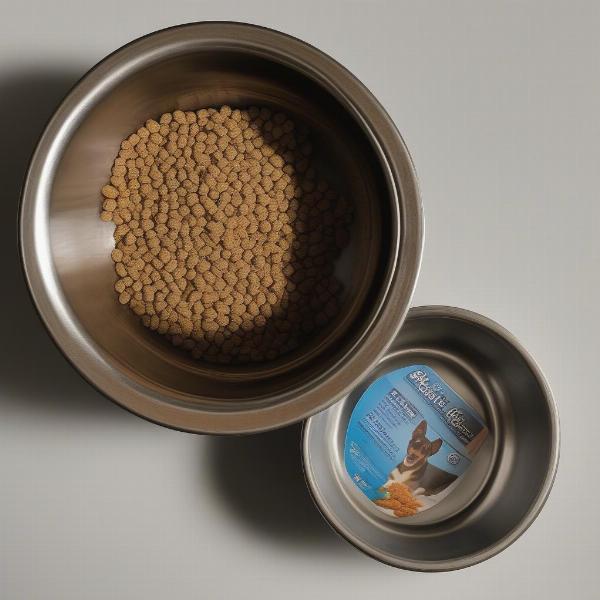Old toy dogs hold a special place in our hearts. These pint-sized companions offer years of love and laughter, and as they age, they require specific care to ensure their comfort and well-being. This guide offers practical advice for navigating the golden years with your beloved old toy dog.
Understanding the Needs of an Old Toy Dog
As your toy dog enters their senior years, their needs change. Understanding these changes is crucial for providing the best possible care. Just like humans, older dogs may experience a decline in mobility, changes in appetite, and potential cognitive decline. This can manifest in various ways, from difficulty navigating stairs to changes in sleep patterns. Recognizing these signs early on allows you to adapt your care routine accordingly.
Common Health Issues in Old Toy Dogs
Several health conditions are more prevalent in older toy breeds. Dental disease, heart problems, arthritis, and kidney issues are among the common concerns. Regular veterinary check-ups are essential for early detection and management of these conditions. Your veterinarian can recommend appropriate treatments, dietary adjustments, and lifestyle modifications to help your old toy dog maintain a good quality of life.
Dental Care for Senior Toy Dogs
Dental care is particularly important for older toy breeds. Smaller mouths often mean more crowded teeth, increasing the risk of dental disease. Regular brushing, dental chews, and professional cleanings can help prevent painful infections and tooth loss. best ear cleaner dogs might also be relevant if ear infections are a concern.
Nutrition and Diet for Old Toy Dogs
 Senior toy dog food
Senior toy dog food
Nutritional needs change with age. Older toy dogs may require a diet lower in calories but higher in fiber and certain nutrients. Your veterinarian can advise you on the best food choices for your dog’s specific needs. Consider switching to a senior-specific formula that is easier to digest and supports joint health.
Exercise and Enrichment for Old Toy Dogs
While your senior toy dog may not be as energetic as they once were, regular exercise remains crucial for maintaining muscle mass, joint mobility, and mental stimulation. Short, gentle walks, playtime in the yard, and interactive toys can keep your old toy dog engaged and happy. dog pens can be helpful for creating safe and contained play areas.
Adapting Activities for Senior Dogs
Remember to adapt activities to your dog’s abilities. Avoid strenuous exercise and focus on low-impact activities. dog cat toys can provide mental stimulation and gentle play.
Creating a Comfortable Environment for Your Old Toy Dog
As your toy dog ages, they may become more sensitive to temperature changes and require a more comfortable resting space. Provide soft bedding, easy access to food and water, and a quiet space where they can relax undisturbed. dog christmas tree topper can add a festive touch to their environment, especially during the holidays.
Conclusion
Caring for an old toy dog is a rewarding experience. By understanding their changing needs and adapting your care accordingly, you can ensure that your beloved companion enjoys a comfortable and fulfilling life in their golden years. Regular veterinary check-ups, a balanced diet, gentle exercise, and a loving environment are key to supporting the health and happiness of your old toy dog.
FAQ
- How often should I take my old toy dog to the vet? Senior dogs should have check-ups at least twice a year.
- What are the signs of cognitive decline in dogs? Disorientation, changes in sleep patterns, and altered interactions with family members can be signs of cognitive decline.
- What kind of food is best for an old toy dog? Senior-specific dog food formulas are designed to meet the nutritional needs of older dogs.
- How much exercise does an old toy dog need? Short, gentle walks and playtime are sufficient for most senior toy dogs.
- How can I make my old toy dog more comfortable? Provide soft bedding, easy access to food and water, and a quiet resting space.
- Is it normal for my old toy dog to sleep more? Yes, older dogs tend to sleep more.
- How can I tell if my old toy dog is in pain? Changes in behavior, such as whining, restlessness, or reluctance to move, can indicate pain.
ILM Dog is a leading resource for dog owners worldwide, offering expert advice on all aspects of dog care, from breed selection to senior care. We offer guidance on nutrition, training, health, grooming, and much more. Whether you’re a first-time dog owner or a seasoned expert, ILM Dog provides valuable insights to help you navigate the joys and challenges of dog ownership. Contact us at [email protected] or +44 20-3965-8624 to learn more about how we can help you provide the best care for your furry friend. dog grass seed could also be a useful resource for creating a pet-friendly outdoor space.